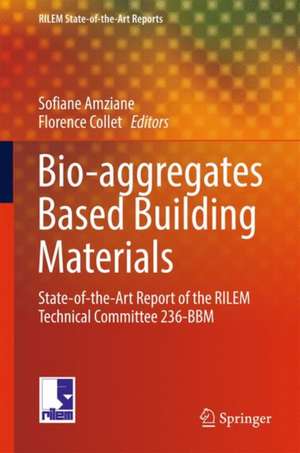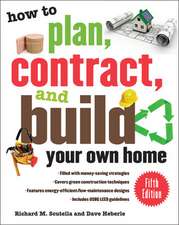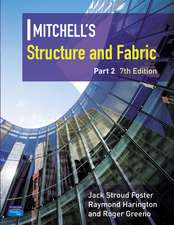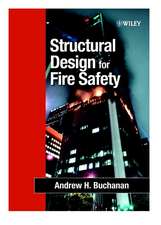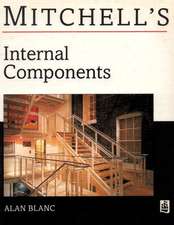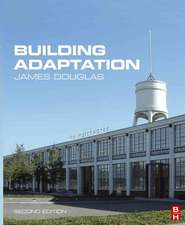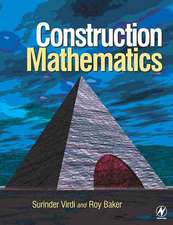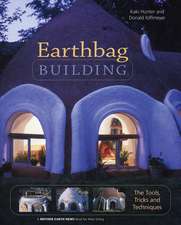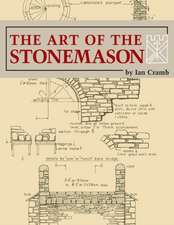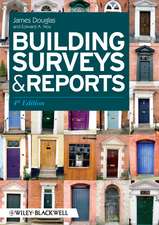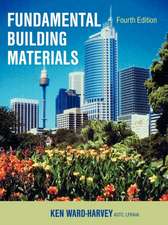Bio-aggregates Based Building Materials: State-of-the-Art Report of the RILEM Technical Committee 236-BBM: RILEM State-of-the-Art Reports, cartea 23
Editat de Sofiane Amziane, Florence Colleten Limba Engleză Hardback – 10 feb 2017
This book includes a state-of-the-art report and an appendix. The state-of-the-art report relates to the description of vegetal aggregates. Then, hygrothermal properties, fire resistance, durability and finally the impact of the variability of the method of production of bio-based concrete are assessed. The appendix is a TC report which presents the experience of a working group. The goal was to define testing methods for the measurement of water absorption, bulk density, particle size distribution, and thermal conductivity of bio aggregates. The work is based on a first round robin test of the TC-BBM where the protocols in use by the different laboratories (labs) are compared. p>
| Toate formatele și edițiile | Preț | Express |
|---|---|---|
| Paperback (1) | 1108.04 lei 6-8 săpt. | |
| SPRINGER NETHERLANDS – 15 iul 2018 | 1108.04 lei 6-8 săpt. | |
| Hardback (1) | 1114.02 lei 6-8 săpt. | |
| SPRINGER NETHERLANDS – 10 feb 2017 | 1114.02 lei 6-8 săpt. |
Din seria RILEM State-of-the-Art Reports
- 15%
 Preț: 643.84 lei
Preț: 643.84 lei - 15%
 Preț: 659.20 lei
Preț: 659.20 lei - 15%
 Preț: 644.18 lei
Preț: 644.18 lei - 15%
 Preț: 637.59 lei
Preț: 637.59 lei - 18%
 Preț: 726.34 lei
Preț: 726.34 lei - 18%
 Preț: 947.50 lei
Preț: 947.50 lei - 20%
 Preț: 565.33 lei
Preț: 565.33 lei - 18%
 Preț: 788.54 lei
Preț: 788.54 lei - 18%
 Preț: 884.22 lei
Preț: 884.22 lei - 18%
 Preț: 953.65 lei
Preț: 953.65 lei - 18%
 Preț: 967.08 lei
Preț: 967.08 lei - 15%
 Preț: 640.06 lei
Preț: 640.06 lei - 15%
 Preț: 631.07 lei
Preț: 631.07 lei - 18%
 Preț: 1227.99 lei
Preț: 1227.99 lei - 15%
 Preț: 644.95 lei
Preț: 644.95 lei - 15%
 Preț: 640.24 lei
Preț: 640.24 lei - 15%
 Preț: 637.46 lei
Preț: 637.46 lei - 20%
 Preț: 589.83 lei
Preț: 589.83 lei - 15%
 Preț: 634.68 lei
Preț: 634.68 lei - 18%
 Preț: 1115.28 lei
Preț: 1115.28 lei - 18%
 Preț: 950.96 lei
Preț: 950.96 lei - 18%
 Preț: 1120.81 lei
Preț: 1120.81 lei - 18%
 Preț: 894.34 lei
Preț: 894.34 lei - 20%
 Preț: 554.91 lei
Preț: 554.91 lei - 15%
 Preț: 635.65 lei
Preț: 635.65 lei - 15%
 Preț: 713.02 lei
Preț: 713.02 lei - 15%
 Preț: 645.79 lei
Preț: 645.79 lei - 15%
 Preț: 583.78 lei
Preț: 583.78 lei - 15%
 Preț: 528.48 lei
Preț: 528.48 lei
Preț: 1114.02 lei
Preț vechi: 1358.56 lei
-18% Nou
Puncte Express: 1671
Preț estimativ în valută:
213.17€ • 227.95$ • 177.74£
213.17€ • 227.95$ • 177.74£
Carte tipărită la comandă
Livrare economică 18 aprilie-02 mai
Preluare comenzi: 021 569.72.76
Specificații
ISBN-13: 9789402410303
ISBN-10: 9402410309
Pagini: 263
Ilustrații: XXXIII, 263 p. 128 illus., 127 illus. in color.
Dimensiuni: 155 x 235 x 18 mm
Greutate: 0.59 kg
Ediția:1st ed. 2017
Editura: SPRINGER NETHERLANDS
Colecția Springer
Seria RILEM State-of-the-Art Reports
Locul publicării:Dordrecht, Netherlands
ISBN-10: 9402410309
Pagini: 263
Ilustrații: XXXIII, 263 p. 128 illus., 127 illus. in color.
Dimensiuni: 155 x 235 x 18 mm
Greutate: 0.59 kg
Ediția:1st ed. 2017
Editura: SPRINGER NETHERLANDS
Colecția Springer
Seria RILEM State-of-the-Art Reports
Locul publicării:Dordrecht, Netherlands
Cuprins
Chapter 1. Chemical composition of bioaggregates and their interactions with mineral binders.- 1.0 Introduction.- 1.1 Composition of hemp stem.- 1.2 Processing of hemp stem and microstructure of hemp shiv.- 1.3 Cell wall components.- 1.4 Chemical composition of bioaggregates.- 1.5 Surface characterization of bioaggregates – adhesion between lignocellulosic aggregates and a mineral binder.- 1.6 Chemical interactions between bioaggregates and mineral binders.- 1.7 Conclusion.- References.- Chapter 2. Porosity, pore size distribution, micro-structure.- 2.0 Introduction.- 2.1 Techniques used to measure porosity.- 2.2 Conclusion.- References.- Chapter 3. Water absorption of plant aggregate.- 3.0 Introduction.- 3.1 Wetting of porous, heterogeneous surfaces.- 3.2 Transfer phenomena in a porous medium.- 3.3 Analogy with adhesion of mortars to a porous support.- 3.4 Overview of the processes of binder/wood adhesion.- 3.5 Conclusion.- References.- Chapter 4. Particle Size Distribution.- 4.0 Introduction.- 4.1 General characteristics of shiv particles.- 4.2 Sieving methods .- 4.3 Image-processing methods.- 4.4 Image-analysis.- 4.5 Characterization of the PSD.- 4.6 Conclusions.- References.- Chapter 5. Bulk density and compressibility.- 5.0 Introduction.- 5.1 Density and porosity, case of hemp shiv.- 5.2 Bulk compressibility.- 5.3 Conclusions and perspectives.- References.- Chapter 6. Hygric and thermal properties of bio-aggregate based building materials.- 6.0 Introduction.- 6.1 Hygric properties.- 6.2 Thermal properties.- 6.3 Concluding remarks on hygrothermal behavior of bio-aggregate based building materials.- References.- Chapter 7. Bio-aggregate based building materials exposed to fire7.1 Introduction.- 7.2 Fire reaction.- 7.3 Fire resistance.- 7.4 Real scale fire tests.- 7.5 Other quaint matter fire test.- References.- Chapter 8. Durability of bio-based concretes.- 8.0 Introduction.- 8.1 Accelerated aging protocols for bio-based construction materials.-8.2 Aging of bio-based concretes.- 8.3 Aging of natural fibres-cement composites.- 8.4 Concluding remarks.- References.- Chapter 9. Effect of testing variables (method of production).- 9.0 Introduction.- 9.1 Materials and methods.- 9.2 Results.- 9.3 Conclusion.- Acknowledgments.- References.- APPENDIX : Technical Commitee Report - Rilem TC 236 BBM - Bio based Building Materials - Round Robin test for hemp shiv Characterisation.- Round Robin Test For Hemp shiv Characterisation.- Part 1 : Evaluation Of Initial Water Content And Water Absorption.- 1 Introduction.- 2 Material.- 52%.- 18%.- 2.1 Microscopical description.- 3 Initial Water Content.- 3.1 Methods.- 3.2 Results.- 3.3 Concluding remarks on initial water content.- 4 Water Absorption.- 4.1 Description of the experimental methods.- 4.2 Results.- 4.3 Concluding remarks.- Summary of Findings.- Round Robin Test For Hemp shiv Characterisation.- Part 2: Bulk Density And Particle Size Distribution.- 5 Introduction.- 6 Material.- 52%.- 18%.- 7 Bulk Density.- 7.1 Methods.- 7.2 Results.- 7.3 Concluding remarks on bulk density.- 8 Particle Size Distribution.- 8.1 Sieving method.- 8.2 Image processing.- 8.3 Comparison between sieving and image analysis results.- 8.4 Concluding remarks on Particle Size Distribution.- Summary Of Findings.- Acknowledgements.- Round Robin Test For Hemp shiv Characterisation.- Part 3 : Thermal Conductivity.- 9 Introduction.- 10 Material.- 52%.- 18%.- 11 Thermal Conductivity.- 11.1 Experimental methods.- 11.2 Results.- 11.3 Concluding remarks.- Summary Of Findings.- Acknowledgements.
Textul de pe ultima copertă
The work of the RILEM Technical Committee (TC -236 BBM) was dedicated to the study of construction materials made from plant particles. It considered the question whether building materials containing as main raw material recyclable and easily available plant particles are renewable.
This book includes a state-of-the-art report and an appendix. The state-of-the-art report relates to the description of vegetal aggregates. Then, hygrothermal properties, fire resistance, durability and finally the impact of the variability of the method of production of bio-based concrete are assessed. The appendix is a TC report which presents the experience of a working group. The goal was to define testing methods for the measurement of water absorption, bulk density, particle size distribution, and thermal conductivity of bio aggregates. The work is based on a first round robin test of the TC-BBM where the protocols in use by the different laboratories (labs) are compared.
This book includes a state-of-the-art report and an appendix. The state-of-the-art report relates to the description of vegetal aggregates. Then, hygrothermal properties, fire resistance, durability and finally the impact of the variability of the method of production of bio-based concrete are assessed. The appendix is a TC report which presents the experience of a working group. The goal was to define testing methods for the measurement of water absorption, bulk density, particle size distribution, and thermal conductivity of bio aggregates. The work is based on a first round robin test of the TC-BBM where the protocols in use by the different laboratories (labs) are compared.
Caracteristici
Provides the state-of-the-art in bio-aggregates Describes multiphysical properties of bio-based building materials Includes recommendations for the characterisation of bio-based aggregates Includes supplementary material: sn.pub/extras
